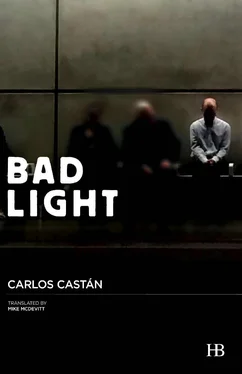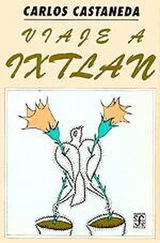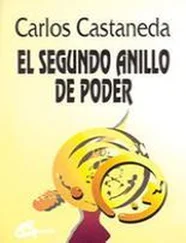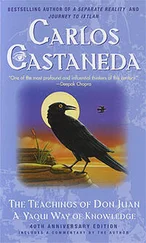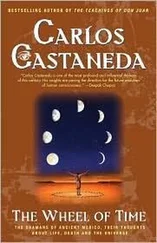Carlos Castán - Bad Light
Здесь есть возможность читать онлайн «Carlos Castán - Bad Light» весь текст электронной книги совершенно бесплатно (целиком полную версию без сокращений). В некоторых случаях можно слушать аудио, скачать через торрент в формате fb2 и присутствует краткое содержание. Год выпуска: 2016, Издательство: Hispabooks, Жанр: Современная проза, на английском языке. Описание произведения, (предисловие) а так же отзывы посетителей доступны на портале библиотеки ЛибКат.
- Название:Bad Light
- Автор:
- Издательство:Hispabooks
- Жанр:
- Год:2016
- ISBN:нет данных
- Рейтинг книги:5 / 5. Голосов: 1
-
Избранное:Добавить в избранное
- Отзывы:
-
Ваша оценка:
- 100
- 1
- 2
- 3
- 4
- 5
Bad Light: краткое содержание, описание и аннотация
Предлагаем к чтению аннотацию, описание, краткое содержание или предисловие (зависит от того, что написал сам автор книги «Bad Light»). Если вы не нашли необходимую информацию о книге — напишите в комментариях, мы постараемся отыскать её.
Carlos Castán
Bad Light
Bad Light — читать онлайн бесплатно полную книгу (весь текст) целиком
Ниже представлен текст книги, разбитый по страницам. Система сохранения места последней прочитанной страницы, позволяет с удобством читать онлайн бесплатно книгу «Bad Light», без необходимости каждый раз заново искать на чём Вы остановились. Поставьте закладку, и сможете в любой момент перейти на страницу, на которой закончили чтение.
Интервал:
Закладка:
I can only think back on the true loves of my life in the dark, and only when I am alone and feel I have the strength. I can still be left shaken by the sound of a handful of women’s names. For the time being, I have no wish to name them, so as not to hear the sound my heart makes down there when, instead of ageing at its normal rate, it races headlong toward death. I know I do so in my dreams — say their names, that is — for I have sometimes woken myself up calling out to them. One of them sleeps naked in my head, a lifeless arm hanging limply in the air like Jacques-Louis David’s Marat ; another, the one who would squat down to take snapshots of all of the cats in the neighborhood of Lavapies peeking out from the patios or sleeping on sawdust in bars, is sobbing, though neither of us will ever know why; and I can see another girl returning from the bookshop in Cuatro Caminos holding a copy of the Diary of Anaïs Nin and a recently shoplifted anthology by Alejandra Pizarnik. The rain is beating down in the street, and she has buried the books deep inside her handbag so as not to ruin them. I remember the scent of the raindrops in her hair and the inscription she wrote me in one of those books: “May your sadness shatter into a thousand pieces in the air like the dandelion on which a small boy has blown with all his might, like a swan shot down in mid-flight, like a Civil Guard.” Her room is filled with photos of female writers who took their own lives, tacked onto the wall with pushpins, and self-penned sketches showing Sylvia Plath with her head in the oven, Virginia Woolf flailing in the middle of the current, and Alfonsina Storni advancing, vacant and zombie-like, toward the center of an ocean filled with black waves rearing up. She would like to have been Max Ernst’s lover, but she stayed by my side, sometimes curled up in a ball at my feet and sometimes pulling on me in her flight to the center of the storms. She was anyone’s match drinking gin, and when she was tipsy she could sing Janis Joplin’s “Mercedes Benz” all the way through, falling into a lengthy silence when she was done, somewhere between exhaustion and oblivion. I always remember her with her bangs plastered against her sweaty brow. The neighbors were no fans of her early morning singing or the noise she made when she bumped into the furniture when she got up to vomit, not to mention her outrageous orgasms, making many a night a veritable war of pounding back and forth on the walls, with fists, with the sole of a shoe, to see who might give in first, until everything settled down more or less at the hour when the subway opened and the streets, still in darkness, began filling up with sleepwalkers making their way to offices and factories.
Life back then was on a knife’s edge between hell and warmth, anguished silence and cries of joy. Somehow we knew, no matter how fiercely tedium struck, that a well-chosen song or a bottle of something or other would always end up coming to our rescue. It was a matter of bearing witness to our own collapse without losing heart altogether, the paradox of having to kill ourselves in order to carry on living, like insects that feed off limbs ripped from their own bodies with their own teeth. Our wound was the show, and its condition, the highlight of the day, a sort of regular report giving an account of the state of the rot that had set in there in the gut, like a gangrene advancing like hordes on horseback, the liver swelling millimeter by millimeter as it turns to cardboard, the ever-stranger dreams in which the lizard in the sake bottle sometimes danced with the worms in the mescal bottle, the candles at the mercy of the night’s winds, infinity all set to be conquered, the valium, the tears, the transaminases.
I see myself lying on the bed in the morning, forcing myself to smoke a cigarette without succumbing to a coughing fit that will, in turn, make my stomach churn even more. A girl is sleeping with her head on my chest, her hair is dirty, it smells of smoke, that hair, and of cold ash. There is a nausea inside my chest that gives occasional signs of life. My nerves dance around that nausea like stripped wires, like anemone writhing around on raw flesh. The minute hand barely advances, as if hauling a great weight behind it, the world is a slow-motion blur, out of focus, upside down at times; though I cannot see it from my bed, I picture a blue earth and trees hanging from a sky filled all of a sudden with puddles. I try to think back to what happened the night before but soon realize that I can’t bear to find out. When memory returns, it does so like a monster emerging from the mist and skewering my shame with the tip of its spear. The mind starts rowing full tilt in the opposite direction, toward the void, trying to blend in with the nothingness, to empty itself of thoughts as far as possible, conjuring up snowy expanses free, if possible, of horizons or footprints, and boreal skies, and calm oceans. To not think, to remember nothing, to make sure the floodgates hold firm, to do whatever it takes rather than come to terms with the unbearable, the images from the night before that begin to stir and take shape, making their presence felt against my wishes. Like a dog defending a farmyard to the death, my nausea growls at the memories that little by little dare to show their faces. It imagines machine guns opening fire at random in every direction. It unleashes a round in my face at point-blank range, it dreams of wiping me off the face of the earth and from history, it fantasizes about snatching me from the minds of others. The water’s surface in the green plastic jug that lives on my bedside table is covered with dust and the odd hair of a cat or God knows who. I drink from that water. All of a sudden I find it fresh and appetizing, and for a moment it tastes of the life I lost, as leafy as the paths I walked straight past or left behind me, one that followed the course of the river, for example, leading to an abandoned windmill at the bottom of the Añisclo canyon, near a small meadow in which I would sit to wolf down spoonfuls of all the honey I spurned and even the very flowers I laughed at, now that the refrigerator is empty but for the smell of wine now drunk and these dry parsley leaves stuck to the plastic walls.
Sometimes, as the month neared its end, we’d steal food from the cat, spreading its Whiskas on slices of bread. But whenever we had a little money to spend, the neighborhood of Malasaña was ours for the taking. We’d always start out in Corripio, right across from the drugstore on the Calle Fuencarral, with Asturian chorizo pie and draft cider to help a few shots of neat absinthe slip down all the easier, before moving on to bottled beer in El Maragato, where we delighted in the foul tempers of the old couple who ran the place and who we knew would end up serving us Roquefort sandwiches on the house. Later, despite my protests (all my attempts to convince her to leave it be were to no avail), she’d insist on heading off in search of Leopoldo María Panero, with whom she had struck up something of a friendship one strange night on which it was I who ended up sleeping with him and one Alicia, the one who collected the corpse, according to the dedication in Narciso , and who stayed up till dawn, licking the poet’s toes the whole night through. If Leopoldo had been let out of the madhouse, he’d turn up sooner or later on one street or another. With his cohort of groupies and aspiring court jesters in tow, hoping some of his doomed-poet aura might rub off on them. He was always wandering around as if hoping to get his ass kicked, and on more than one occasion he got his wish in the end. I remember the floor in El Valle, covered in sawdust, mussel shells, and olive pits, and Leopoldo writhing around on that floor in his raincoat, unleashing an awful cackle straight out of a horror movie. He liked to urinate in the middle of the street, in every direction, spinning around, standing square in the center of the night beneath a witch’s moon, its dark side and visible side drenched in a beery sweat. His madness was legendary and beautiful. I remember his black corduroy pants, too, his long raincoat, his feet on the table, any table, occasionally knocking the glasses of rum and Coke to the floor while reciting unintelligible verses that spoke of ruins, of fly-eaten brains, and of the disaster that is living. He’d get in people’s faces on the slightest pretext, brandishing his fists at the drop of a hat and aping the poses boxers like to strike in the photos taken for the posters, accusing any waiter who dared take him to task for his behavior or throw him straight out of the bar of being a fascist, unaware as they were that he was the star of the disenchantment, the prince of the madcap night, the light shimmering at the bottom of all our wells.
Читать дальшеИнтервал:
Закладка:
Похожие книги на «Bad Light»
Представляем Вашему вниманию похожие книги на «Bad Light» списком для выбора. Мы отобрали схожую по названию и смыслу литературу в надежде предоставить читателям больше вариантов отыскать новые, интересные, ещё непрочитанные произведения.
Обсуждение, отзывы о книге «Bad Light» и просто собственные мнения читателей. Оставьте ваши комментарии, напишите, что Вы думаете о произведении, его смысле или главных героях. Укажите что конкретно понравилось, а что нет, и почему Вы так считаете.
